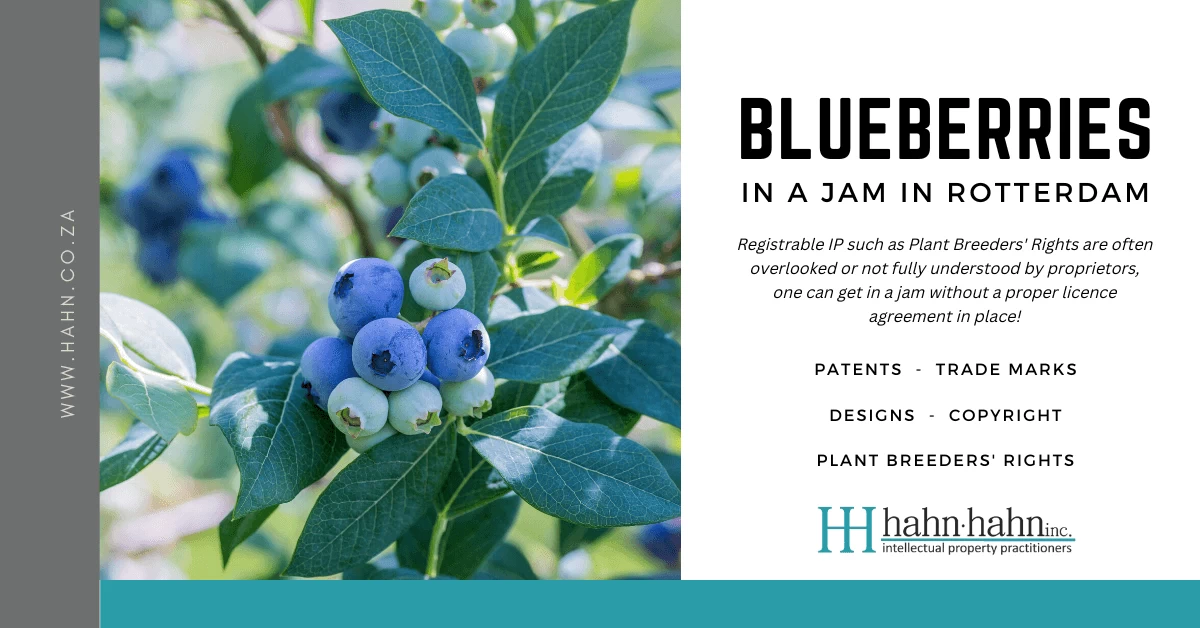
In late October 2020, a shipment of blueberries originating from South Africa was seized by the European Union Customs Authority in Rotterdam. The seizure caused a big uproar amongst blueberry growers in South Africa who (mostly) felt that they were being exploited by Plant Breeders’ Rights holders who licensed their intellectual property rights to South African growers. There are of course two sides to the story with the truth possibly resting somewhere in the middle.
The fruit was produced by Ross Berries (part of the Rossouw Farming Group) and exported from South Africa without the permission of the rights holder for the blueberry variety, United Exports Group.
The custom enforcement action was carried out by the Dutch Customs Authority, who, upon the request of the United Exports Group, issued a Red Alert Notice resulting in the confiscation of two containers, with some 10 tons and 16 tons of fruit respectively.
In doing so, the European Union Customs Authority recognized the community's plant variety rights with respect to the OZblu® blueberry varieties held by United Exports Group and grown by the South African fruit grower without a license to do so.
Background
In 2016, the United Exports Group became a joint titleholder of the proprietary blueberry varieties (OZblu®) developed by the breeder Dave Mazzardis. In the current co-ownership arrangement, United Exports is responsible for the variety commercialization and return of royalties to the breeding program for further variety development. In South Africa, the majority of the OZblu® fruit production is handled at the United Exports’ farms with roughly 40 percent of the fruit volume grown by the third-party producers. Both internal and external fruit production takes place in South Africa, where, according to United Exports, its partnerships with third-party producers have been very successful.
The United Exports’ standard license agreements with growers contemplate a contract with a producer who leases and grows plants under license and with the support from United Exports’ Agronomists and produces fruit for sale under the Ozblu® brands. In 2017, Charles Rossouw of Ross Berries signed two such licence agreements with United Exports. In May 2020, he terminated both licenses in the belief he could keep the plants and continue both production and marketing of fruit using United Exports brands and varieties. However, a condition of termination of the license agreements was that the plants be returned.
What happened next
On 17 November 2020, United Exports reached a settlement with Ross Berries and granted them a further interim and temporary license. Ross Berries was able to sell the remainder of their end-of-season fruit for that season under strict terms to ensure that United’s Intellectual Property was protected and have agreed that they submit themselves to confidential arbitration with regard to the removal of the plant material from the farm. In light of the COVID-19 crisis and with blueberries being a food crop, United Exports chose not to pursue the destruction of the fruit in the seized containers and halting the entire harvest.
Ross Berries saw the matter somewhat differently and issued a press statement that:
“United Exports [has] had to agree not to interfere in any further marketing of Ross Berries blueberries, provided that, inter alia, United Exports’ OZBlu® trademark is not used.”
United Exports called the claim to victory “patently false” and a misunderstanding of the legal and commercial consequences of violating their proprietary rights and maintained that the shipments of its blueberry varietals represented a license breach on the part of Ross Berries.
Ross Berries in turn alleged that United Exports only has registered Plant Breeders' Rights (PBR) for two of the nine varieties which they acquired from United Exports.
This would mean that Ross Berries has been paying royalties that United Exports was not entitled to claim.
Ross Berries further accused United Exports of bullying farmers who had also signed license agreements with them and who were trying to sell their blueberries on the free market. These tactics allegedly resulted in fruit being sold below their market value.
United Exports stated that confidential arbitration proceedings will continue between the parties. When the 2020 season is over, the Rossouw Farming Group’s right to continue to produce United Exports’ OZblu® proprietary blueberries must be newly agreed with United Exports, failing which the Rossouw Farming Group’s right to continue to produce United Export’s OZblu® proprietary blueberry will terminate.
Take home message
Registrable IP rights such as patents, trade marks, designs, and Plant Breeders’ Rights are territorial rights which means that the proprietor only receives protection in those countries in which rights have been granted. In this case, United Exports had acquired Plant Breeders’ Rights in South Africa (be it for two or nine of its blueberry varieties) as well as in Europe.
Before entering into a license agreement with the (alleged) holder of an IP right, a licensee would do well to check that the right being licensed has in fact been granted to the proprietor and that it is still in force. Patents, designs, and Plant Breeders’ Rights have a limited life span and the proprietor would therefore not ordinarily be entitled to royalties once the IP right has expired.
In the event that a license agreement has been terminated/ not renewed, the licensee is no longer allowed to use the previously licensed IP right and nevertheless doing so would constitute infringement. The termination of a license agreement may also include the return of machinery or, in this case, removal of the plants that the license related to from the ex-licensee’s farm.
Written by Claudia Berndt, a qualified attorney and patent attorney. For more information on Plant Breeders Rights in South Africa please contact the writer at claudia@hahn.co.za.
Hahn & Hahn, specialists in Intellectual Property Law.
